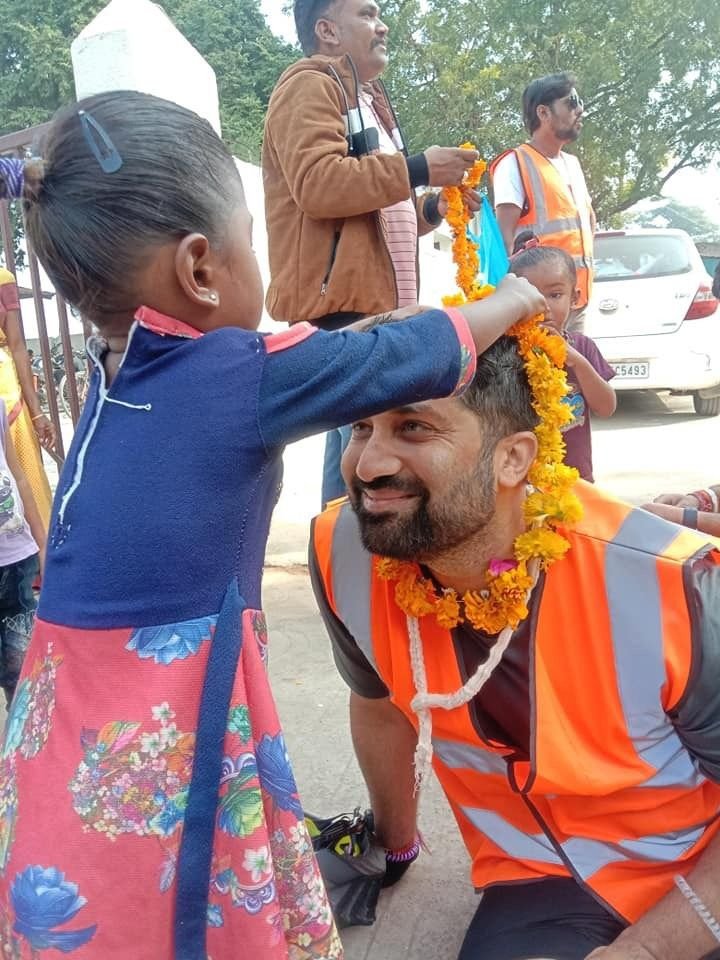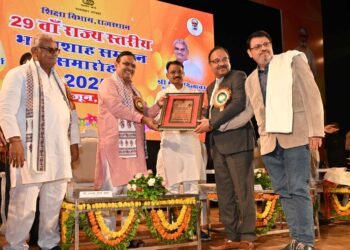Hanuman Dass, Founder and Chairman of Go Dharmic, spoke to Rusen Kumar of India India for Leadership Series about the foundation’s work, strategies for overcoming poverty and the climate crisis, and the long-term aims of the foundation.
Go Dharmic is an international humanitarian and environmental NGO started by Hanuman Dass. Offering a platform to promote compassionate action, Go Dharmic’s founding ethos is Love All. Feed All. Serve All and they work as ambassadors of peace. Go Dharmic runs multiple social action campaigns that cover all 17 United Nations sustainable development goals.
Excerpts of an interview:
Could you elaborate a little more about what the Go Dharmic Foundation is?
The Go Dharmic Foundation is a humanitarian organisation I founded in 2011, inspired by the principles of Sanatana Dharma. We have over 3000 volunteers globally. Our community works for the benefit of all living beings and our planet through simple acts of kindness, compassion, and love.
With 17 active campaigns, Go Dharmic does not recognise international borders. Instead, we operate as a universal charity aiming to relieve suffering unconditionally. We express universal sister and brotherhood through action, the idea of Sub Ek, all one, and vasudhaiva kutumbhakam, ‘the world is one family. It is a progressive, forward-thinking, and active organisation that serves as a non-political, non-violent force for peace and goodness in our world.

Could you tell us about the journey of the Foundation?
I was in my mid-twenties, working in central London, and the financial markets were doing well. I’d met the person who would become my wife, and life was going very well for me. But, I would go through central London every day and see countless unfortunate individuals living on the street. They looked hungry and alone, and I recognised that this was unacceptable. Maharaji, my spiritual teacher, had told me, Love all, Feed all, Serve all, and Remember God. I felt an urge to do something to show some love to these people sitting on the streets in the cold. They were disconnected from the rushing business of the City.
They were cut off from the community, with others mostly ignoring their plight. So, a friend and I decided to buy some bananas, went into central London, and simply handed them out. It was a small and straightforward act – this would become our first food distribution. After that, we returned with more food and a banner saying Love All. Feed All, and Go Dharmic was born. The next thing I knew, everyone expected us to be there. We started to distribute hot meals, tea and coffee, and suddenly there were huge lines and many volunteers. Over a decade later, Go Dharmic has diversified to become a movement for social change with thousands of volunteers.

What are the issues and problems that Go Dharmic focuses on?
Unlike other charities and NGOs that limit themselves to one activity, we perform a variety of extensive campaigns, including projects for Environmental Action, Poverty Alleviation, Education, Plant-Based and Organic Diets, and Crisis Response. We see this diversity and flexibility as a great strength, allowing us to respond rapidly to suffering and changing conditions and help where other groups may not. For example, through our various campaigns, we have distributed over 10 million meals globally, planted over 75,000 mangrove trees, developed over 101 learning facilities, funded medical checks, covered cataract operations, housed Ukrainian refugees, and more.
So, what targets have you set to tackle these issues and problems?
2 Million Mangroves by 2026
We launched our campaign: Give it a Grow, to protect river-based communities at risk of flooding. In May 2022, we planted 50,000 mangroves in the Dharma Forest in West Bengal, the most biodiverse place in India. By 2026 we expect to grow by 2 million. Mangroves help absorb climate-negative gases, support local wildlife and ecology, and act as a natural defence against flooding.
Helping 100,000 Children by 2023
Through our Shape-A-Future campaign, we build schools and libraries in underprivileged communities. On average, we develop two libraries a month. To date, we have helped over 75,000 children through our various education and sanitation projects and are on target to help 100,000 children before 2023.
Opening 5 New Regular Food Distributions by 2023
We have distributed over 10 million meals to vulnerable people and low-income families, making a massive difference within local communities. The “feeding project”, as we call it, is now present in several cities, including London, Glasgow, Ahmedabad, and New York. Most recently, we began our 12th regular UK food distribution in Watford.

Most of your campaigns are structured around collaborations. What partners do you look for when setting up campaigns, and how do you maintain a mutually fruitful partnership?
We have had many successful collaborations. To look at some of our associations this year, we partnered with MARICO LTD. to provide extensive health checks for 600 high-risk government personnel in India, which were a tremendous success. In addition, we partnered with BYJU’S, a digital learning company, a couple of months ago, who gave us free access to their education software licences. These licences are being distributed to children from disadvantaged backgrounds. This India-wide initiative has started in Gujarat, where more than 100 licences have been distributed to pupils at Shahpur Primary School in Gandhinagar, but we are currently in the process of expanding that reach. We also have many long-term partnerships, such as with Uber: assisting in the transportation of food and volunteers, Vedanta: who has helped us develop 25 libraries, and ONGC: which provided us with the resources to commission over 50 toilets and sanitation units in North East India.
Crucially, there should be no competition in philanthropy, love, or service. So, we try to remain open to helping as many people as possible. It’s in the people and the results that the value comes through, and not through being closed-off. You can only have maximal outreach via pooling resources together. Only by working with others can you have the most effective results. In this way, we see ourselves as decentralised. We try to create a platform where any individual, corporation, or organisation can join us to help needy people.
What have been Go Dharmic’s most significant achievements, and what have been some of the moments you treasure?
I feel that the Go Dharmic team has made a profound difference over the last two years throughout the Covid pandemic. We had thousands of volunteers serving whilst the Delta variant was ravaging India. These volunteers helped people who would otherwise have been at risk of food poverty, safely and carefully minimising the risk of spreading the virus. We partnered with Uber and had hundreds of volunteers come forward and support those who were isolated and otherwise unable to access food or essential hygiene products. We served the elderly. We supported hospitals that were running out of oxygen by supplying oxygen cylinders. It was almost a warlike situation. It was an outstanding achievement for the Go Dharmic India team to be able to serve in the way that they did throughout that unprecedented time.
I also feel that during times of disaster, we’ve been able to mobilise and muster our energies and services quickly. We’ve been able to provide relief efforts to blindspots of the mass media: for example, in places like Assam in India, or West Bengal, ravaged by cyclones year-on-year through climate change.
Recently, we’ve established the Dharma forest, our mangrove forest that will protect villages living in the region from flooding and other adverse weather. In addition, it will re-establish much of the biodiversity lost in the area due to harmful greenhouse gases. I’m particularly proud of this ongoing project because its effects should only compound, and it will make a profound positive climate difference.
All-round, everything is meaningful: feeding a child in the UK, housing Ukrainian refugees, providing emergency sanitary equipment for women, building learning facilities and libraries in Gujarat etc. All are essential expressions of the central Go Dharmic mission.
Go Dharmic Foundation has several large-scale active campaigns, ranging from disaster relief and environmental action to poverty alleviation and education programs, but what sort of actions can individuals perform every day to make a positive difference in the world?
At an individual level, we should stick to the core principles of Dharma. It is a way of life. Going dharmic will help us become consciously and unconsciously happier and kinder. We can also help those struggling in our local area. Think of small acts of kindness such as giving food to a neighbour or a hungry stranger.
Beyond this, we advocate a few simple changes: minimise food waste (only buy what you need, and if you do have too much, learn how to store and preserve food), go organic and vegan (an organic vegan diet is far healthier for us as individuals, kinder to animals, it is also more environmentally sustainable, typically utilising less water and land, and producing food that absorbs harmful gases).
These are powerful ways that we may incorporate dharmic living into our lives without going into war zones or disaster areas. Instead, we can perform acts of service at home.
From here, where do you see the Go Dharmic Foundation going over the next 5 to 10 years?
For me, the development of Go Dharmic is the grace and prasad of my Guru, Neem Karoli Baba. It is a blessing and is seva to be able to conduct this work. As more people have joined and come into this stream, we hope we will continue to flourish. And not only will we be able to support many more beneficiaries worldwide, but we will also help ourselves as volunteers and participants because we are all one. The distinction between the giver and receiver is an illusion. We are all part of this interaction and process. We all live the same life and have the same needs. All benefit from the love and the profound relationships created and maintained. There is no imbalance. Everyone flourishes. I hope to see the community grow in a decentralised way, where many other organisations can work with us.
How can someone support and participate in Go Dharmic’s work and campaigns?
Annually, in December, we retrace Mahatma Gandhi’s famous salt march from Ahmedabad to the Arabian Sea coast as an 8-day cycling event called The Salt Ride. It is a 384km, all-inclusive experience where the group will live out dharmic ideals, meditate in ashrams, and practice seva. Moreover, it is a great introduction to Go Dharmic’s family and outreach by following a landmark event that brought freedom through non-violence and love.
Sign-up for The Salt Ride: https://register.enthuse.com/ps/event/SaltRide2022
For more information, see The Salt Ride brochure: https://bit.ly/3REMBfL
Anyone can volunteer, support, set up a food distribution, or contact us at Go Dharmic via: info@godharmic.com or volunteer@godharmic.com
Alternatively, they can download the Go Dharmic App for more updates! And, anyone living a dharmic life is participating in Go Dharmic’s work!
Also Read: India CSR – How ‘Go Dharmic’ NGO serving society globally
About the Author
Rusen Kumar is the editor at India CSR.






















